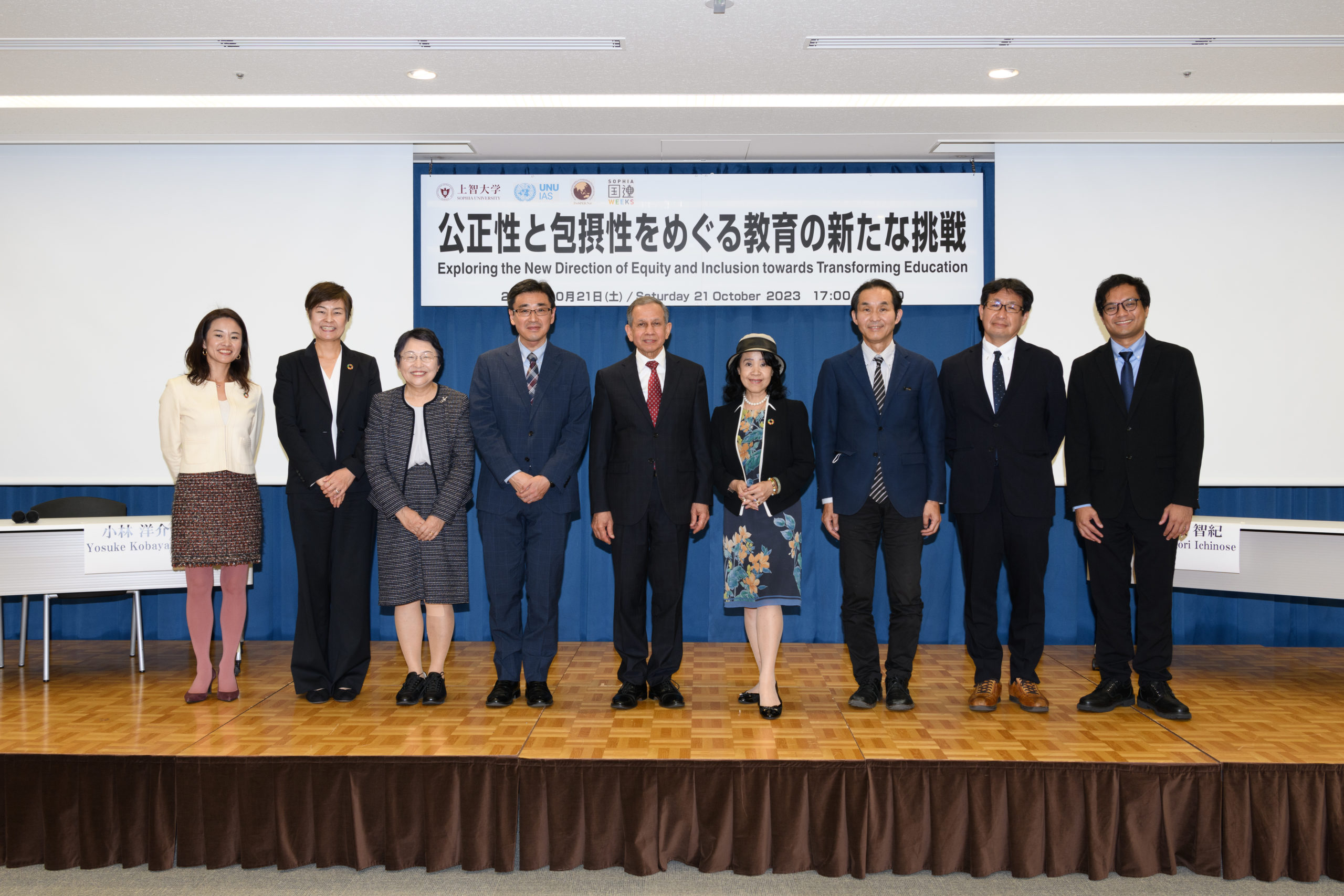 On 21 October 2023, UNU-IAS co-organised the ProSPER.Net Sustainability Forum as part of the UN Weeks at Sophia University. The event discussed the effects of the COVID-19 crisis on the provision of inclusive and equitable education, particularly its impact on vulnerable populations, as well as the efforts of Higher Education Institutions (HEIs) in striving for sustainability and inclusion.
On 21 October 2023, UNU-IAS co-organised the ProSPER.Net Sustainability Forum as part of the UN Weeks at Sophia University. The event discussed the effects of the COVID-19 crisis on the provision of inclusive and equitable education, particularly its impact on vulnerable populations, as well as the efforts of Higher Education Institutions (HEIs) in striving for sustainability and inclusion.
Opening the session moderated by Miki Konishi (Programme Coordinator, UNU-IAS), Tetsuo Morishita (Vice President for Global Academic Affairs, Sophia University) stressed that the achievement of SDG 4 (quality education) will require the cooperation of many people across borders. Deepak Sharma (Professor, Asian Institute of Technology, Board Chair of ProSPER.Net) noted that the pandemic brought into question the inequalities and silos embedded in educational systems.
Shinobu Yume Yamaguchi (Director, UNU-IAS) highlighted the importance of examining the implications of the pandemic to build resilient education systems. Despite the many challenges, positive aspects also emerged, including partnerships among schools, homes, and communities; greater appreciation and use of technology; and increased attention to students’ physical and mental health. Reiji Higashioka (Director, Ministry’s Secretariat, Office of Environmental Education, Ministry of the Environment, Japan) underlined the significance of promoting equity and inclusion by involving professionals and their research-based knowledge.
In a keynote speech, Libing Wang (Chief, Section for Educational Innovation and Skills Development, UNESCO Multisectoral Regional Office in Bangkok) noted that equity and inclusion had emerged as pivotal themes reshaping higher education. He highlighted a number of recommendations, such as policies to facilitate the recruitment of disadvantaged students; equity and inclusion assessments covering all disciplines; and comprehensive student support services.
A panel discussion moderated by Miki Sugimura (Faculty of Human Sciences, Sophia University) shared insights on recent developments aimed at increasing access, quality, and equity in higher education. Yosuke Kobayashi (Director, International Affairs Division, Higher Education Bureau, Ministry of Education, Culture, Sports, Science and Technology (MEXT), Japan) spoke about higher education policies in Japan centered on equity and inclusion, including support programmes for international students and those evacuated from Ukraine. He highlighted the Toyama-Kanazawa Declaration at the G7 Education Ministers’ Meeting in May 2023 which called for increased international mobility to develop new ideas towards global cooperation.
Athapol Anunthavorasakul (Faculty of Education, Chulalongkorn University) discussed inclusion initiatives at universities in Thailand, such as new pedagogy for remote instruction and redesigning lessons and activities to suit students’ needs. Carl Odulio (Vice Chancellor for Research and Development, University of the Philippines Diliman) presented on his university’s experiences during the pandemic and the resulting changes, such as the implementation of blended, hybrid flexible, and virtual learning.
Focusing on students with immigrant backgrounds, Tomonori Ichinose (Faculty of Education, Miyagi University of Education) discussed competencies required for teaching in multicultural and multilingual settings, as well as integration models and practices used in OECD countries to foster educational integration for refugees. Brenson Andres (Graduate School of Human Sciences, Sophia University) shared student perspectives and how the pandemic impacted their learning capacity, competence, and well-being. Positive impacts included the development of personalised study habits and the convenience and accessibility of online classes, while negative impacts included Zoom fatigue, the lack of learning engagement, and decreased social interaction. HEIs responded with a range of initiatives, such as academic leniency, mental health programmes, social events, and financial relief. Recommendations moving forward included further accommodations for international students, venues for dialogues, and raising awareness of mental health programmes.
Summing up the discussion, Deepak Sharma (Professor, Asian Institute of Technology, Board Chair of ProSPER.Net) emphasised inclusion, equity, and fairness as the key drivers of transformation, and underlined the importance of collaboration skills and technological adaptations.
In closing, Jonghwi Park (Head of Innovation and Education Programme, UNU-IAS) highlighted three key learnings from the session: (i) inequity and exclusion in education remain, and have been exacerbated by the COVID-19 crisis; (ii) key players in the education sector have made great efforts and more focused interventions to achieve equality and inclusivity in education; and (iii) achieving equity and inclusion in education cannot be achieved by one sector but through collaboration between HEIs, UN agencies, the private sector, and governments.
(Photo credit: Sophia University)
Presentations
Keynote presentation:
Equity and Inclusion: Setting the Agenda for the Transformation of Higher Education in Asia and the Pacific
Libing Wang (Chief, Section for Educational Innovation and Skills Development (EISD), UNESCO Multisectoral Regional Office in Bangkok)
Panel Discussion presentations:
Higher Education Policies in Japan to Ensure Equity and Inclusion
Yosuke Kobayashi (Director, International Affairs Division, Higher Education Bureau, Ministry of Education, Culture, Sports, Science and Technology (MEXT), Japan)
Challenges of Equity and Role of University to Build Inclusion in Education after the COVID-19 Crisis: Cases of Thailand
Athapol Anunthavorasakul (ESD Center, Faculty of Education, Chulalongkorn University)
Evolution of Learning Spaces in the University: UP Diliman’s Experiences Due to the COVID 19 Pandemic
Carl Odulio (Vice Chancellor for Research and Development, University of the Philippines Diliman)
Equity and Inclusion towards Transforming Education to the Immigrant Background Students
Tomonori Ichinose (Faculty of Education, Miyagi University of Education)
Promoting Inclusion, Equity, and Well-Being in HEIs: Perceptions of Students Affected by the COVID-19 Pandemic
Brenson Andres (Graduate School of Human Sciences, Sophia University)
